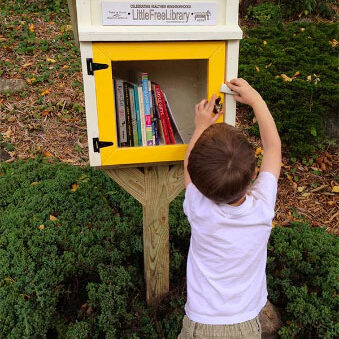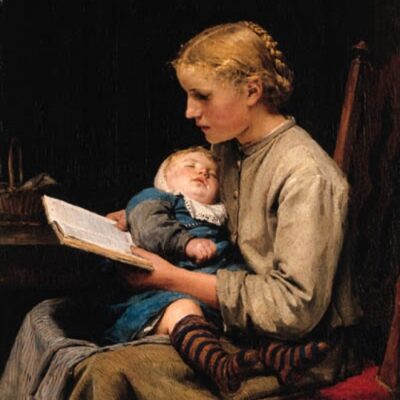The Ogress and the Orphans by Kelly Barnhill
This is a story about an ogress.
Like all ogres, she spoke little and thought much. She was careful and considerate. Her heavy feet trod lightly on the ground. [p. 1]
And fifteen orphans who live with Myron and Matron in the Orphan House.
They were good children, these orphans: studious and hardworking and kind. And they loved one another dearly, ever so much more than they loved themselves. [p. 2]
This is a story about how hatred is subtly and not so subtly inspired and promoted, how bullying and brutality, when encouraged and condoned, become the norm. It is a story about a community that loses faith, hope, and charity when everything they care about is stripped from them and who finger-point and condemn and blame their troubles on “the others.” This is a parable about a dragon. And how, under his leadership, greed overtook kindness.
It is not my intention to speak ill of dragons generally. It is a terrible practice to prejudge anyone, be they ogres or orphans or dragons or nosy neighbors or assistant principals, or people with unusual manners. It is important, always, to treat everyone with compassion and respect. This is well known.
As for dragons in particular, they are as diverse in their dispositions as any other creature. I, myself, have encountered dragons of every personality type—shy, gregarious, lazy, fastidious, self-centered, bighearted, enthusiastic, and brave.
But thisdragon, I’m sorry to say, was none of these. This dragon was greedy, perfidious, and indifferent. He felt no remorse, and he had not been redeemed. He delighted in discord and sowed acrimony wherever he went. These are all large words, and I apologize for them. But my feelings about this dragon are large. [p. 3]
This is a fable about the crows who befriend the ogress, acknowledge her generosity, and protect her when she faces the wrath of the townspeople.
The Ogress did not speak Crow. Instead, she smiled at the crows, and bowed low. So low that the top of her head nearly touched the ground. The crows were impressed with her excellent manners. “Hello, my friends,” the Ogress said. “And welcome. I don’t have much to offer guests, I’m afraid, but I do have a bit of hardtack in my bags. And some dried corn. If I crumble them together, they will make a fine meal. There is no use in keeping it to myself. Everything tastes better when you share it.”
The crows were deeply moved. In town, no one greeted them at all. In town, no one offered them a meal or referred to them as guests. In town, they were only called pests. Or varmints. The people in town had become grumpier than usual since the Library burned down. Even earlier, some of the older crows insisted—-ever since that blasted shiny mayor showed up. Some people were so grumpy that they even threw rocks at the crows from time to time. Rocks! The very idea! [p. 19]
This is a story that I don’t think should be placed in an age-appropriate category. I loved it now; I would have loved it when I was five (when read aloud to me, of course). I may, as an adult, notice more parallels to current day problems, but that was not the appeal of the book for me. There were lots of other strengths making this a terrific read.
I loved the way the orphans slowly took center stage. Minneapolis writer Kelly Barnhill (pictured below) allows us to regard how they process their current circumstances without comparing the situation to a previous era. She uses her amazing writing skills to create children who understand the real heart of the matter but deal with the anxiety and frustration of being ignored by adults. Their perceptive insights consistently counter the knee-jerk reactions of the town’s grown-ups.
They had long listened to the muttering as people walked past the gate, blaming the Ogress in Stone-in-the-Glen, the very fact of her living in town, for causing the town’s alteration from lovely to not. The orphans, for their part, dismissed that notion out of hand.
Anthea called it “too stupid to consider.”
Bartleby declared it “philosophically untenable, and morally gross.”
Cass, the third oldest, as usual said nothing, but she glared when anyone spoke that way. [p. 23]
I loved how the author explored the effects of an adult’s desire to protect children from ugly truths and the fact that children are incredibly observant and logical and know what’s what a good bit of the time. Here are orphans Anthea and Bartleby reacting to their guardian Myron’s attempts to pretend all is well when clearly it is not.
Myron said nothing for a long moment. Then he pressed a firm smile onto his creased face. “Don’t spend another moment worrying about any of it, my darlings.” he said, his voice overly bright and brittle. “After a day or two, this will all blow over. People lose interest in nonsensical things after a bit. Cooler heads always prevail!”
Anthea leaned back, catching Bartleby’s eye from behind Myron’s back. They held each other’s gaze briefly, their faces communicating the same thing. He doesn’t believe a word that he’s saying. He’s just as scared as we are. [p. 229]
I loved the humor in this novel; and admire the way Kelly Barnhill was able to create a villain both terrifying and comical. The mayor’s interactions with the townspeople are priceless as in the following scene where Anthea is bravely attempting to present the facts to him.
Anthea ignored all of this. “Mr. Mayor!” she roared.
The Mayor frowned. He scanned the crowd. Anthea knocked on the boards by his feet, but it took him a long minute before he thought to look down. He gave Anthea a quizzical look. “Are you a child?” he asked mildly.
Anthea blanched. It was not the question she was expecting. “Yes!” she said.
“Ah,” the Mayor said, his face unfurling in a magnanimous smile. He opened his arms in a grand gesture, letting the fabric of his coat ripple splendidly in the light. “I’ve met children before. It is one of my many attributes as mayor.”
A woman next to Anthea swooned as the pressed crowd of adults nearby burst into applause. Anthea turned around and glared. “Stop applauding!” she ordered. “What’s the matter with you? All of you have met children before!”
But the Mayor wasn’t listening, and neither were the people nearby. “I should be hearing more chanting, my good neighbors!” the Mayor said, and people chanted more.
“No more ogres!” the crowd said, again and again.
Anthea pounded on the boards. The Mayor looked to his left and right, and once again slowly turned his gaze down and registered Anthea’s presence with a slightly surprised smile. “Oh!” he said. “Are you a child?”
“Yes,” Anthea said acidly. “We’ve already discussed that. You need to listen to me.”
“I’ve met children before!” the Mayor enthused. [pp. 274-275]
I highly recommend this captivating fantasy published in 2022 by Algonquin Young Readers. From the stunning cover by Yuta Onoda (pictured below) to the very last word of the narrative, I remained totally immersed in the lives of the characters and the struggle of good vs evil.

















